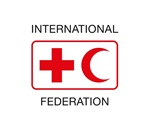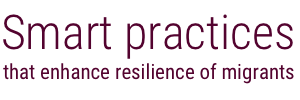The Danish Red Cross has been developing and testing methods and models to strengthen cooperation between local government and civil society in order to ensure the best possible integration of refugees. The “Bridging” project has been ongoing from January 2014 until now, involving five Danish municipalities and over 30 civil society organisations. Through using the method of co-creation, key actors from municipalities and civil society, in cooperation, identify needs and formulate new solutions to integration challenges.
The objective is to develop and test methods and models to strengthen cooperation between local government and civil society in order to ensure the best possible integration of refugees. The project involves five Danish municipalities and over 30 civil society organisations. Through using the method of co-creation, key actors from municipalities and civil society, in cooperation, identify needs and formulate new solutions to integration challenges.
Through the project, public authorities and civil society are gaining knowledge and understanding of each other’s strengths. As a result roles are more clearly defined, resources used effectively and commitment and sustainable and long term solutions created. Through activities such as mapping workshops, identification of 3-5 areas of focus, involvement of refugees etc. ways of cooperating on integration are developed and tested.
The five project-municipalities (and the 30+ civil society organisations) are being monitored closely. Consultants as well as volunteers have their daily life in the activities, combined with follow-up interviews with the same refugees, volunteers and social workers, so that progress can be documented.
Refugees who are in frequent contact with locals generally feel more welcome in their communities, gain a better understanding of society and are generally more motivated to participate in society.
The creation of models and best practices to be used in implementing the project in other municipalities. The tools and best practices will be used in the 90 local branches, where the Danish Red Cross has voluntary based integration activities.
Design: P1 – focusing on the needs and vulnerabilities of migrants, their wider needs for emotional and social support, not just physical needs.
Implementation: P3 – supporting the aspirations of migrants to be integrated into the community & country where they are residing.
Through the project, public authorities and civil society are gaining knowledge and understanding of each other’s strengths. As a result roles are more clearly defined, resources used effectively and commitment and sustainable and long term solutions created
The local project management model: local steering committees operating within the communities. Their members are municipal employees, both from field and management level as well as representatives from civil society organizations.
8 out of 10 municipalities estimate in a national Danish survey that they cooperate more with civil society on integration than they did a year ago.
86 percent estimate that civil society has a positive impact on the reception and integration of refugees.
Smart practices
Smart practices report and database survey
About the report
People migrate in pursuit of a better life for themselves and their families. As described in the International Federation of Red Cross and Red Crescent Societies’ (IFRC) Policy on Migration, “migrants are persons who leave or flee their habitual residence to go to new places – usually abroad – to seek opportunities or safer and better prospects.
Read more
About the International Federation

